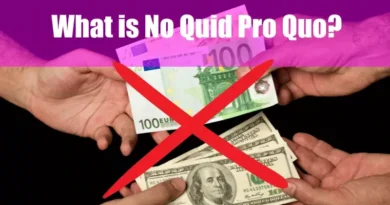Here are key takeaways from the article:
- Quid pro quo and bribery are distinct, though closely related, with quid pro quo referring to a reciprocal exchange and bribery involving corrupt intent.
- Quid pro quo becomes bribery when it is aimed at corruptly influencing an official or violating ethical duties.
- Bribery is characterized by an illegal quid pro quo, where the intent is to corrupt or improperly sway an official’s actions for personal gain.
- While quid pro quo can be part of bribery, it is not always illegal and is common in many legitimate transactions; intent is key in distinguishing between the two.
Let’s discuss in detail:
Introduction
Quid pro quo and bribery are not the same, although they share similarities. Quid pro quo, a Latin term meaning “something for something,” refers to an exchange of favors where both parties mutually benefit. This can be legal and is common in various situations, like job negotiations or deals between organizations. However, bribery involves offering or receiving something of value to influence the actions of someone in a public or legal role, which is a criminal offense. Essentially, while all bribery involves quid pro quo (an exchange), not all quid pro quo is bribery. The key distinction lies in whether the exchange is done to corrupt a public or legal duty, which makes it bribery and illegal in most contexts.
To better understand the distinction, it’s crucial to break down their meanings, legal frameworks, and how they operate in various contexts.
What Is Quid Pro Quo?

“Quid pro quo” is a Latin phrase meaning “something for something.” It refers to an exchange where one party provides something of value in return for a favor or action from another party. This can happen in many legitimate transactions. For example, buying a product in a store is a form of quid pro quo—you give money and receive goods. Quid pro quo can be perfectly legal as long as both parties participate in a legitimate exchange without deceit or coercion.
However, quid pro quo becomes problematic when used in certain contexts, particularly in public office or official matters, as it could potentially lead to corruption. When this exchange involves influencing official acts in return for personal gain, it might cross into bribery or corruption.
Defining Bribery

Bribery occurs when someone offers, gives, receives, or solicits something of value with the intent to influence the actions of a public official or another person in a position of authority. The intent is usually to sway the official to take a particular action, such as awarding a contract or passing legislation, which they would not have done otherwise. Bribery involves corrupt intent, which means there is a clear expectation that the recipient will act in a way that benefits the briber.
In legal terms, bribery is defined by three key elements:
- Offering or promising something of value.
- An intent to influence an official action.
- The official act being influenced is tied to the public official’s duties (in the case of public bribery) or in violation of their fiduciary duty (in private bribery).
Bribery is illegal under federal law, such as the U.S. Code 18 Section 201, and can carry severe penalties, including imprisonment, hefty fines, and disqualification from public office.
Is All Quid Pro Quo Bribery?
While quid pro quo is a necessary element of bribery, not all quid pro quo arrangements are illegal. For example, in a typical business deal, one party offers payment, and the other party provides services or products—this is a quid pro quo, but it is legal because it is a voluntary transaction without corrupt intent.
However, when a quid pro quo involves an exchange that aims to corrupt the integrity of an official action, it becomes bribery. For example, offering money to a government official in exchange for a construction contract is a clear case of bribery because the official’s duties are being compromised for personal gain.
Thus, the distinction lies in intent. In a simple quid pro quo, both parties exchange something of value without any illegal or corrupt motivations. Bribery, conversely, involves the intent to improperly influence someone’s decisions in a position of authority, typically for personal gain.
Legal Examples
A famous case that illustrates the concept of bribery involved former Illinois Governor Rod Blagojevich. Blagojevich attempted to sell a U.S. Senate seat in exchange for personal favors and financial gain. This clear quid pro quo was not just an unethical exchange but also illegal bribery under U.S. law. The transaction had a corrupt intent—he was trying to profit personally by leveraging his position of power.

On the other hand, legitimate quid pro quo exchanges occur regularly in contractual agreements. For example, paying a lawyer for legal services is quid pro quo, but it’s not bribery because both parties are engaging in a lawful and voluntary exchange without any corrupt intent.
Quid Pro Quo in Gratuities and Favors
In legal contexts, there is also a difference between bribery and illegal gratuities. Gratuities are a type of “reward” offered after an official act has taken place, rather than beforehand, and are considered less serious than bribery. However, they are still illegal in many circumstances, especially when given to influence future actions or as a reward for favorable treatment. For instance, giving a gift to a public official after they have helped you secure a government contract may not be classified as bribery but could still be prosecuted as an illegal gratuity under certain statutes.
In such cases, quid pro quo exists, but the timing and nature of the exchange can determine the legal consequences.
Bribery in Different Contexts
Bribery isn’t limited to the public sector. It can also occur in private businesses, known as commercial bribery. This might involve a company offering payments or gifts to a competitor’s employee to sway decisions about pricing, products, or contracts. This type of bribery undermines fair competition and is similarly illegal.
In contrast, quid pro quo occurs in numerous private settings where it’s perfectly legal. For example, an employer offering a bonus for high performance is a form of quid pro quo that benefits both the company and the employee. It’s legal because it doesn’t involve any unlawful or corrupt action.

Bribery vs. Extortion
Extortion is another crime that can sometimes be confused with bribery. However, extortion involves obtaining something of value through coercion, threats, or intimidation rather than offering something voluntarily in return for an action. While bribery involves a willing exchange where the official has the option to decline, extortion places the recipient under pressure to comply out of fear.
Although both bribery and extortion involve corrupt exchanges, the methods used are different. Bribery focuses on voluntary cooperation with corrupt intent, while extortion involves forced compliance through threats.
Key Differences Between Bribery and Quid Pro Quo
- Intent: Quid pro quo becomes illegal when there’s an intention to corruptly influence official actions, making it bribery. Without corrupt intent, quid pro quo remains legal in most settings.
- Legal Outcome: Bribery is always illegal because it involves an attempt to influence someone improperly. Quid pro quo is not necessarily illegal and is often part of regular, lawful business exchanges.
- Public vs. Private Context: Bribery often involves public officials or individuals in positions of authority, while quid pro quo can happen in any private or public transaction, with the legal implications depending on the nature of the exchange.
Conclusion
In summary, quid pro quo and bribery are not the same, though they are closely related. Quid pro quo becomes bribery when the exchange is aimed at corruptly influencing an official or violating ethical duties. Bribery, by definition, involves an illegal quid pro quo, where the intent is to corrupt or sway an official’s actions for personal gain. While quid pro quo is part of bribery, it is not always illegal and is a common part of many legitimate transactions. Understanding the legal distinctions is key, as the difference often lies in the intent behind the exchange and the parties involved.









